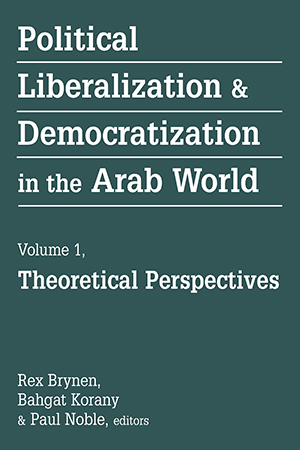Long dominated by authoritarian regimes, the Arab World is now experiencing a variety of factors—both internal and external—-that pose the challenge of change. Significant degrees of political liberalization have occurred already in Egypt, Lebanon, Jordan, and Kuwait, although the extent to which this presages eventual democratization is far from self-evident. Elsewhere—for example, in Syria—regimes have resisted demands for expanded public freedoms, and in still other countries—notably Sudan, Algeria, and Yemen—democratic experiments have been aborted or derailed by civil strife.
This book focuses on the major factors shaping liberalization and democratization in the Arab context, as well as the role played by particular social groups.
Rex Brynen is associate professor of political science at McGill University. He is author of Sanctuary and Survival: The PLO in Lebanon. Bahgat Korany is professor of political science at the Université de Montréal, and director of the Inter-University Consortium for Arab Studies. His books include How Foreign Policy Decisions are Made and (with M. Flory et al.) Régimes politiques arabes. Paul Noble is associate professor of political science and chair of the Middle East studies program at McGill University, as well as author of numerous articles on Arab politics.
"This is a well-written, well-structured, and comprehensive volume. It will prove especially helpful to graduate students in Middle East politics preparing for degree exams, but is accessible enough to be widely adopted for undergraduate course use."—Marsha Pripstein Posusney, MESA Bulletin
" ...the editors are to be commended for pulling together a stimulating collection of articles on subjects of great importance to the field. It is an extremely valuable contributioin."— Paul Kingston
" This is an excellent collection of essays, and a leading work in the field of Middle Eastern political economy. In 16, well-argued and well-developed chapters, the contributors provide a comprehensive survey of forces that are shaping today s Arab societies... the authors have been very successful in their efforts to marry detailed empirical observations with challenging theoretical propositions... I very much look forward to following the debate that this book will generate." —Anoushiravan Ehteshami, International Affairs
" Plays an important role in the field by placing different approaches that characterize the study of political reform around the world in an Arab context. . . turn to this book for introduction, clarification, and most of all, coverage of a dialogue among scholars about the underlying issues of political liberalization and democratization."—Arab Studies Journal
"The debate between the fourteen contributors in this important volume is whether the locus of political change and reform can emanate from the deeply entrenched, fortified, and rent- dependent regimes that characterize the Arab world or from societies where the ideology of opposition is predominantly but not solely Islamist. . . . As scholars focus on the debate, . . .serious and rigorous work will benefit from the insights compiled by Messrs, Brynen, Korany, and Noble." —Augustus Richard Norton, American Political Science Review
" Brynen, Korany, and Noble have done a great service to both Middle Eastern studies and comparative politics with the publication of this work."—Digest of Middle East Studies
"A balanced account of past and present hurdles to the realization of Arab democracy, and of the awesome challenges that lie ahead."—Middle East Quarterly
"An excellent introduction to the theoretical debates raging in social sciences over the prospects for political liberalization and democratization in the Arab world."—Bulletin of Regional Cooperation in the Middle East
"A welcome contribution to the discussion of democratization in the Arab world.... On a topic of continuing importance, this is all in all the best collection of essays yet."—Foreign Affairs








